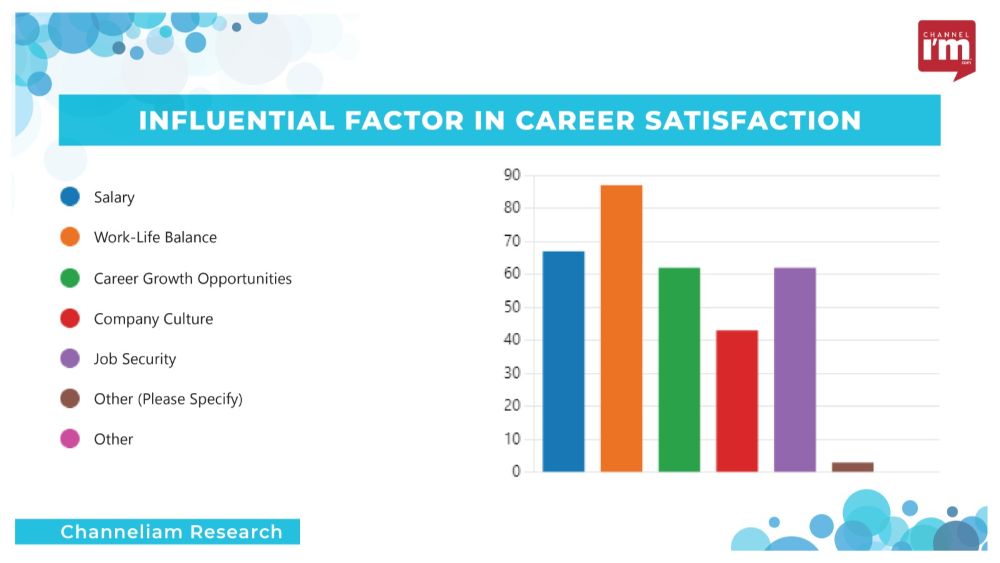
Channeliam.com, India’s exclusive digital video media platform for startups and entrepreneurs conducted an extensive survey to gain a deeper understanding of the current state of job satisfaction, compensation, and workplace culture across diverse industries. The survey aimed to uncover nuanced experiences and shed light on factors that influence employees in their professional lives.

Methodology
The survey was distributed to a representative sample of around 10,000 people across sectors, ensuring a diverse set of responses. Participants were asked to rate their job satisfaction, expectations on their career and qualitative insights were gathered through open-ended questions. The focus areas included job satisfaction levels, salary contentment, and the role of office culture in shaping overall job contentment.
Job Satisfaction Spectrum:
Analysis of the responses revealed that 36% of participants rated their job satisfaction at 3, followed closely by 28% at 2. This distribution suggests a significant portion of the workforce falls within the moderate satisfaction range, indicating a complex and varied landscape of job contentment.
Qualitative insights into job satisfaction delved into various factors influencing participants. Common themes included the importance of meaningful work, a positive work environment, and opportunities for professional growth. While salary was not the sole driver, it emerged as a significant factor affecting overall job satisfaction.

Key Motivators:
When inquired about the key motivator for employees, it was revealed that 27% prioritized Work-Life Balance, surpassing Salary, which garnered a preference from 20% of respondents. Moreover, 19% expressed a preference for career growth, while 13% highlighted the significance of company culture. This underscores the central role of a well-balanced and satisfying professional life in driving employee motivation.
Salary Satisfaction: The survey uncovered a striking finding about salary satisfaction, with 50% of respondents indicating dissatisfaction with their current pay scale. This points to a persistent challenge for organizations in aligning compensation with employee expectations and the rising cost of living. The disparity between job satisfaction and salary contentment raises significant questions about the economic implications and evolving expectations of the modern workforce.

The Role of Office Culture:
The survey explored the impact of office culture on job satisfaction. The findings emphasized that a positive and inclusive culture is essential for bolstering job satisfaction. Participants highlighted the significance of camaraderie, effective communication, and a supportive work environment. Organizations prioritizing these aspects are more likely to cultivate a workforce that feels valued and motivated.
Optimism in Career Opportunities:
The survey delves into participants’ perspectives on career opportunities and unveiled a range of sentiments. Notably, approximately 30% of respondents demonstrated a positive outlook, expressing optimism towards the prospects of career growth. This subgroup appears to harbor a sense of confidence and anticipation regarding their professional trajectory. Conversely, a substantial 46% of participants assumed a neutral stance, indicating a balanced or perhaps contemplative view of their current and future career prospects. In contrast, a discernable 12% of respondents showcased pessimism in their responses, suggesting a notable degree of skepticism or concern regarding career opportunities and growth.

Motivational Factors: The survey probed into the fundamental drivers that propel employees in their professional roles, revealing a noteworthy hierarchy of motivational factors. A surprising 27% of respondents identified Work-Life Balance as their foremost motivator, surpassing the traditionally pivotal factor of salary, which garnered the preference of 20% of participants. This unexpected revelation highlights a significant shift in employee priorities, suggesting that a harmonious equilibrium between work and personal life has become increasingly crucial in fostering job satisfaction and motivation.
Moreover, 19% of respondents expressed a strong inclination towards career growth as a key motivator. This emphasis on professional advancement underscores the inherent desire for individuals to continuall..y evolve and progress in their careers. The acknowledgment of career growth as a substantial motivator aligns with the intrinsic human need for development and achievement in the professional sphere.

Intriguingly, 13% of participants identified company culture as a motivating factor. This highlights the significance of the workplace environment and organizational values in shaping employee motivation. A positive and inclusive company culture, marked by effective communication, mutual support, and a sense of belonging, evidently contributes to the overall job satisfaction and commitment of employees.
Collectively, these findings underscore the multifaceted nature of employee motivation. While traditional factors like salary and career growth remain influential, the prominence of work-life balance and company culture suggests a shifting paradigm in employees’ expectations.
Conclusion:

In conclusion, the survey provides rich insights into the multifaceted nature of job satisfaction. It highlights the need for organizations to reassess their strategies related to employee engagement, compensation, and workplace culture. This detailed report serves as a valuable resource for businesses aiming to enhance the overall well-being and satisfaction of their workforce, fostering an environment where employees not only perform efficiently but also find fulfillment and meaning in their professional endeavors.

